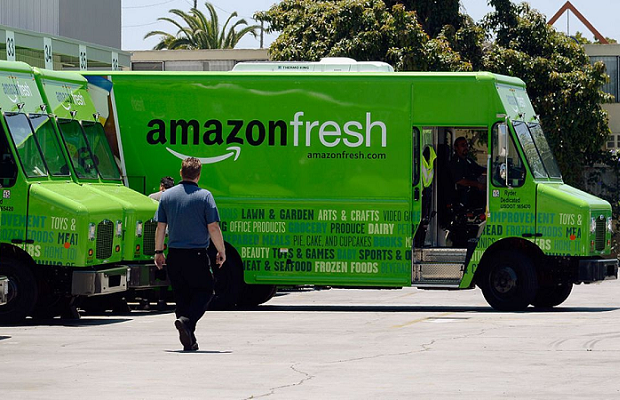Amazon Fresh delivery now free for Prime members in London and the South East, with the retailer set to expand further across the UK this year.
The move comes as leading UK supermarkets have expanded their online delivery services to cater for higher ecommerce demand prompted by the Covid-19 lockdown.
Prime members can now use the Amazon Fresh service without paying additional delivery fees on orders over £40.
Amazon has been selling groceries in the UK since it launched its Grocery Store in 2010 and followed that up with Amazon Fresh in 2016, offering until now, same-day groceries for an additional fee.
Delivery is promised in a two-hour window and Amazon says the service is usually as fast as same-day when orders are placed before 9pm. At the same time, the minimum order threshold has been reduced to £15 from £40.
From today, Prime members in 300 postcodes in London and the South East, including Surrey, Hampshire, Hertfordshire and Bedfordshire, will be able to order food from dairy products, fresh meat, fish, fruit and vegetables to household essentials and general groceries from brands including Booths, Whole Foods Market, Pepsi and Danone and specialist producers including Gail’s Artisan baker, C. Lidgate and Paxton & Whitfield. The retailer plans to expand the service to millions of Prime members across the UK this year.
The news comes as supermarket rival Tesco has more than doubled the availability of delivery slots to 1.3m a week and has seen online grow to 16% of its total UK sales from 9% previously. Waitrose has seen its online orders more than double this year so far and has responded by expanding fulfilment and delivery from stores and opening new fulfilment centres in London. Ocado, meanwhile, has said that Covid-19 will redraw the landscape for online groceries.
Industry comment
Paul Kirkland, Director of Retail and Hospitality, Fujitsu UK, said: “The grocery sector has been transformed overnight since the coronavirus outbreak, with more consumers than ever before flocking to supermarkets’ online platforms rather than physical stores. So it should come as no surprise that the industry behemoth Amazon is now after a bigger slice of this fast-growing market.
“During the pandemic, online food sales nearly doubled and many grocery stores struggled to keep pace with the sky-rocketing demand. But Amazon’s tried and tested ecommerce and delivery models mean its more than well placed to take advantage of this new surge in demand online, and compete with traditional supermarkets for online orders while lockdown measures are still in place.”
Michael Schirrmacher, UK Managing Director at Bloomreach, said: “Amazon’s further investment in its online grocery service shows how strong the online grocery sector is right now. With the pandemic leading to more of us shopping for our essential shopping online, the company has sensed an opportunity and is planning on seizing it. This plays a part into a larger picture of well-prepared businesses doing well during the pandemic: those who have previously invested in their digital commerce channels are better equipped to take advantage of changing consumer habits and are now reaping the benefits from it.
“There has been a flurry of digital innovation in online grocery over the past few months: from Ocado prioritising the most vulnerable and NHS workers to Sainsbury’s brand new queueing app helping shoppers decide when to visit a shop, the market has shown how quickly it’s adjusted to a new world. By making inflexible deliveries a thing of the past, Amazon is banking on the notion that providing a fast, efficient and quality experience can increase its share of the online grocery market pie. Our State of Commerce Experience report, conducted by Forrester and commissioned by Bloomreach, shows this is a smart move: nearly 40% of respondents to the survey stated that they would pay more for a better experience. Businesses must understand how to amplify and grow their digital channel offerings to ensure they can meet the changing expectations of today’s customers, otherwise they will be left in the wake of trailblazers like Amazon.”

